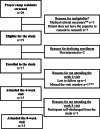Combining mHealth Technology and Pharmacotherapy to Improve Mental Health Outcomes and Reduce Human Rights Abuses in West Africa: Intervention Field Trial
- PMID: 38619212
- PMCID: PMC11017829
- DOI: 10.2196/53096
Combining mHealth Technology and Pharmacotherapy to Improve Mental Health Outcomes and Reduce Human Rights Abuses in West Africa: Intervention Field Trial
Abstract
Background: In West Africa, healers greatly outnumber trained mental health professionals. People with serious mental illness (SMI) are often seen by healers in "prayer camps" where they may also experience human rights abuses. We developed "M&M," an 8-week-long dual-pronged intervention involving (1) a smartphone-delivered toolkit designed to expose healers to brief psychosocial interventions and encourage them to preserve human rights (M-Healer app), and (2) a visiting nurse who provides medications to their patients (Mobile Nurse).
Objective: We examined the feasibility, acceptability, safety, and preliminary effectiveness of the M&M intervention in real-world prayer camp settings.
Methods: We conducted a single-arm field trial of M&M with people with SMI and healers at a prayer camp in Ghana. Healers were provided smartphones with M-Healer installed and were trained by practice facilitators to use the digital toolkit. In parallel, a study nurse visited their prayer camp to administer medications to their patients. Clinical assessors administered study measures to participants with SMI at pretreatment (baseline), midtreatment (4 weeks) and post treatment (8 weeks).
Results: Seventeen participants were enrolled and most (n=15, 88.3%) were retained. Participants had an average age of 44.3 (SD 13.9) years and 59% (n=10) of them were male. Fourteen (82%) participants had a diagnosis of schizophrenia and 2 (18%) were diagnosed with bipolar disorder. Four healers were trained to use M-Healer. On average, they self-initiated app use 31.9 (SD 28.9) times per week. Healers watched an average of 19.1 (SD 21.2) videos, responded to 1.5 (SD 2.4) prompts, and used the app for 5.3 (SD 2.7) days weekly. Pre-post analyses revealed a significant and clinically meaningful reduction in psychiatric symptom severity (Brief Psychiatric Rating Scale score range 52.3 to 30.9; Brief Symptom Inventory score range 76.4 to 27.9), psychological distress (Talbieh Brief Distress Inventory score range 37.7 to 16.9), shame (Other as Shamer Scale score range 41.9 to 28.5), and stigma (Brief Internalized Stigma of Mental Illness Scale score range 11.8 to 10.3). We recorded a significant reduction in days chained (1.6 to 0.5) and a promising trend for reduction in the days of forced fasting (2.6 to 0.0, P=.06). We did not identify significant pre-post changes in patient-reported working alliance with healers (Working Alliance Inventory), depressive symptom severity (Patient Health Questionnaire-9), quality of life (Lehman Quality of Life Interview for the Mentally Ill), beliefs about medication (Beliefs about Medications Questionnaire-General Harm subscale), or other human rights abuses. No major side effects, health and safety violations, or serious adverse events occurred over the course of the trial.
Conclusions: The M&M intervention proved to be feasible, acceptable, safe, and clinically promising. Preliminary findings suggest that the M-Healer toolkit may have shifted healers' behaviors at the prayer camp so that they commit fewer human rights abuses.
Keywords: Africa; CAM; abuse; alternative; app; applications; apps; behavior change; behaviour change; bipolar; bipolar disorder; complementary; depression; depressive; feasibility, acceptability, safety; healer; healers; human rights; mHealth; medication; medications; mental; mobile health; pharmacological; pharmacology; pharmacotherapy; psychosocial; schizophrenia; schizophrenic; schizophrenics; training.
© Dror Ben-Zeev, Anna Larsen, Dzifa A Attah, Kwadwo Obeng, Alexa Beaulieu, Seth M Asafo, Jonathan Kuma Gavi, Arya Kadakia, Emmanuel Quame Sottie, Sammy Ohene, Lola Kola, Kevin Hallgren, Jaime Snyder, Pamela Y Collins, Angela Ofori-Atta, M-Healer Research Team. Originally published in JMIR Mental Health (https://mental.jmir.org).
Conflict of interest statement
Figures


Similar articles
-
A Digital Toolkit (M-Healer) to Improve Care and Reduce Human Rights Abuses Against People With Mental Illness in West Africa: User-Centered Design, Development, and Usability Study.JMIR Ment Health. 2021 Jul 2;8(7):e28526. doi: 10.2196/28526. JMIR Ment Health. 2021. PMID: 34255712 Free PMC article.
-
Prayer Camps and Biomedical Care in Ghana: Is Collaboration in Mental Health Care Possible?PLoS One. 2016 Sep 12;11(9):e0162305. doi: 10.1371/journal.pone.0162305. eCollection 2016. PLoS One. 2016. PMID: 27618551 Free PMC article.
-
A Personalized Approach Bias Modification Smartphone App ("SWiPE") to Reduce Alcohol Use: Open-Label Feasibility, Acceptability, and Preliminary Effectiveness Study.JMIR Mhealth Uhealth. 2021 Dec 10;9(12):e31353. doi: 10.2196/31353. JMIR Mhealth Uhealth. 2021. PMID: 34890355 Free PMC article. Clinical Trial.
-
Behavioural modification interventions for medically unexplained symptoms in primary care: systematic reviews and economic evaluation.Health Technol Assess. 2020 Sep;24(46):1-490. doi: 10.3310/hta24460. Health Technol Assess. 2020. PMID: 32975190 Free PMC article.
-
Novel Augmentation Strategies in Major Depression.Dan Med J. 2017 Apr;64(4):B5338. Dan Med J. 2017. PMID: 28385173 Review.
Cited by
-
Adolescent mental health services in West Africa: a comparative analysis of Burkina Faso, Ghana, and Niger.Child Adolesc Psychiatry Ment Health. 2024 Oct 14;18(1):130. doi: 10.1186/s13034-024-00827-8. Child Adolesc Psychiatry Ment Health. 2024. PMID: 39402621 Free PMC article.
-
mHealth and Digital Innovations as Catalysts for Transforming Mental Health Care in Ghana.Glob Health Sci Pract. 2024 Dec 20;12(6):e2400062. doi: 10.9745/GHSP-D-24-00062. Print 2024 Dec 20. Glob Health Sci Pract. 2024. PMID: 39500590 Free PMC article.
-
A scoping review to evaluate the efficacy of combining traditional healing and modern psychiatry in global mental healthcare.Glob Ment Health (Camb). 2025 Feb 27;12:e35. doi: 10.1017/gmh.2025.20. eCollection 2025. Glob Ment Health (Camb). 2025. PMID: 40160384 Free PMC article. Review.
-
Sexual trauma and interest in mobile health among women with mental illness in Ghana.Internet Interv. 2025 Apr 9;40:100829. doi: 10.1016/j.invent.2025.100829. eCollection 2025 Jun. Internet Interv. 2025. PMID: 40276094 Free PMC article.
References
-
- Ae-Ngibise K, Cooper S, Adiibokah E, et al. ‘Whether you like it or not people with mental problems are going to go to them’: a qualitative exploration into the widespread use of traditional and faith healers in the provision of mental health care in Ghana. Int Rev Psychiatry. 2010;22(6):558–567. doi: 10.3109/09540261.2010.536149. doi. Medline. - DOI - PubMed

